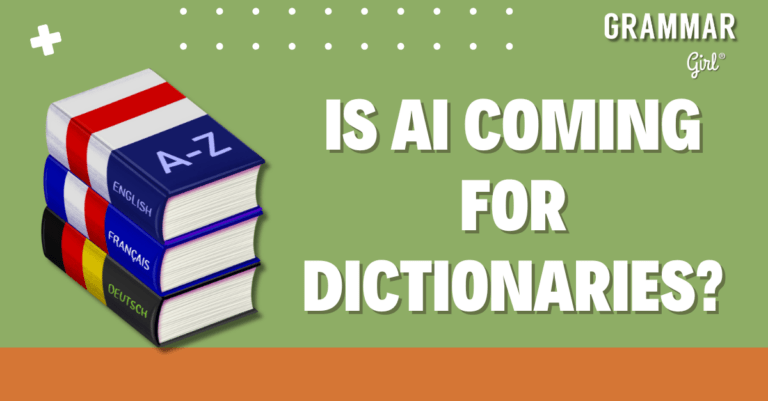Dictionaries have been struggling financially for a long time, and some companies seem to think AI is the solutions to some of their problems, but not everyone is so sure.
In a recent Grammar Girl interview, lexicographer and Wordnik founder Erin McKean shared her thoughts on how AI is influencing the world of dictionaries—and why some of its promises don’t quite add up.
AI will have trouble replacing lexicographers
Although some publishers may see AI as a replacement for human expertise, Erin is skeptical—and not just philosophically. She points out that AI systems are incredibly expensive to train, run, and maintain.
“Lexicographers are way cheaper than AI engineers.”
Can AI even do the job?
In her own research, Erin and her collaborators tested large language models (LLMs) on a range of dictionary-related tasks. The results? Mixed at best.
AI struggled with:
-
Alphabetizing words.
-
Identifying new words in a corpus.
-
Generating International Phonetic Alphabet pronunciations.
-
Handling nuanced tasks that require deep linguistic context.
“What they’re really giving you is what they think the next most probable word is. Is that a true word? Often not.”
One task AI performed relatively well was rewriting complex definitions for younger readers—a useful, but limited, application.
Copyright enforcement and unintended consequences
Erin also raised concerns about the copyright fights between publishers and AI companies. If fair use gets knocked down by courts, it could have an unintended chilling effect on language research, lexicography, and computational linguistics.
“If all that data is no longer considered fair game for research because the AI tools have been bullies about it, our scientific progress in these areas will crawl to a halt.”
Lexicographers and researchers, she notes, don’t have the funding to license data at the same scale as tech giants. If text becomes locked away for proprietary AI use, it may not just limit innovation—it could reshape how we define language altogether.
The bigger picture: context, meaning, and human intelligence
Language isn’t static—and its meaning relies heavily on context. As Erin puts it:
“Say the word ‘toast.’ You don’t know if you’re getting champagne or bread until I say more.”
While LLMs attempt to simulate understanding through patterns and prediction, they lack the human ability to interpret, question, and reason about meaning in flexible ways. That’s a core reason Erin prefers the term “imitation intelligence” over “artificial intelligence.”
Listen to the full interview above or on your favorite podcast platform, and hear why Erin believes the future of lexicography is still human—and still fascinating.
***
🎧 Want Even More More from Erin?
In a separate interview, Erin and Mignon talked about how Erin runs an entire online dictionary with the goal of having ALL the English words. But Wordnik is not only huge, it’s also quirky and fun. Hear how you can play along by adopting a word, making your own lists, using the API for word games or a word of the day, adding words or definitions, and trawling the internet for interesting sentences.




